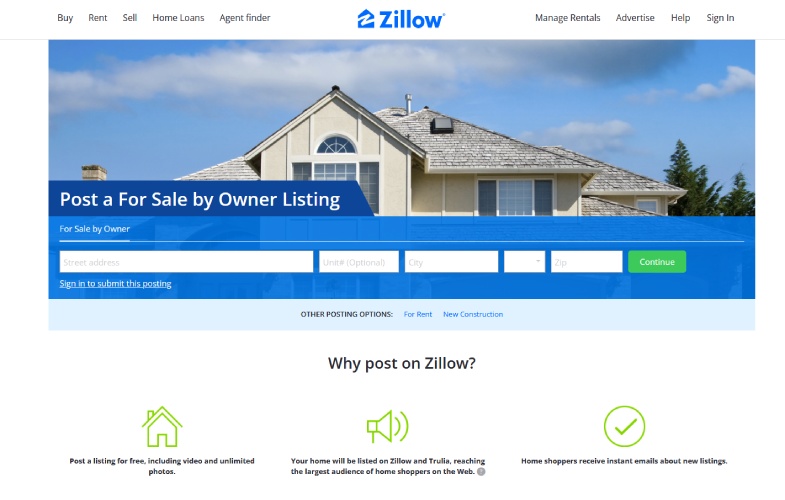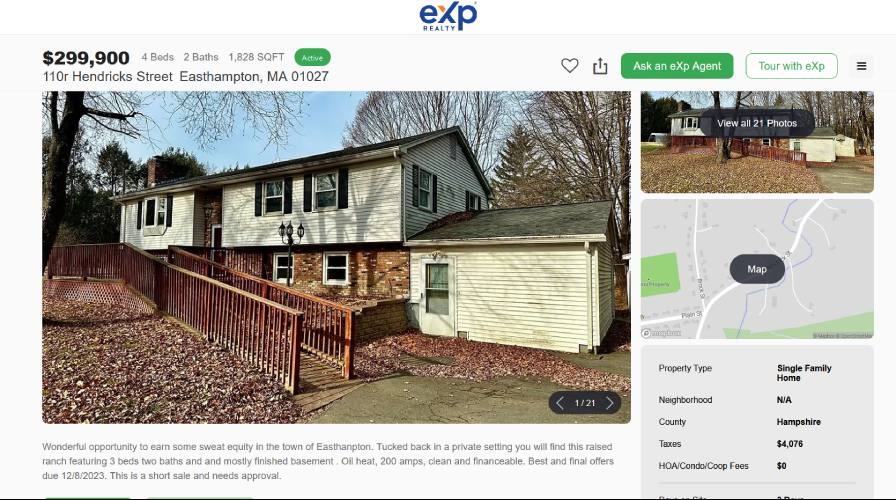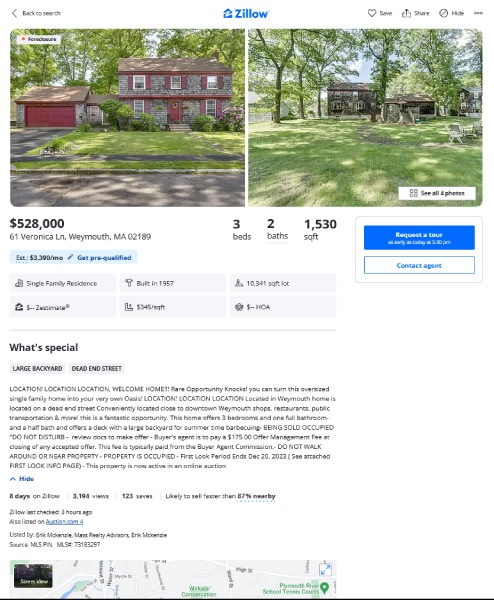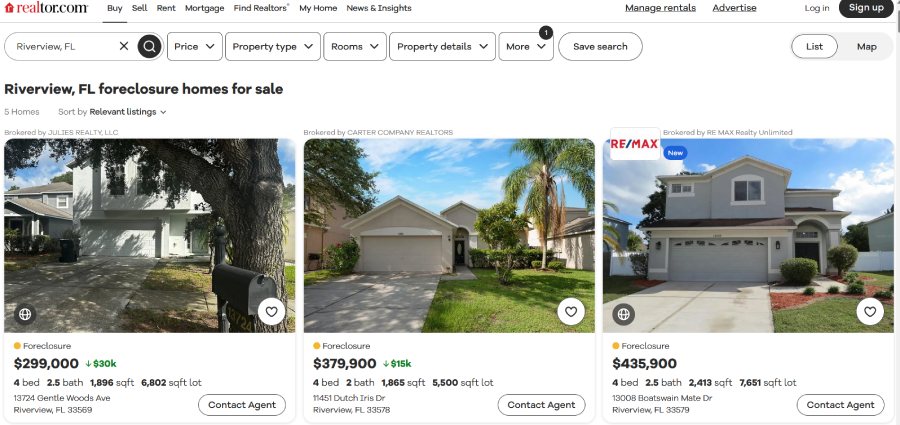Whether you’re a new or experienced real estate investor, you may have asked, “What is a short sale in real estate?” The simple answer is that a short sale is when a homeowner owes more for their home than its current market value and puts it up for sale. Their short sale mortgage is said to be “underwater,” and if they secure a buyer, they must get bank approval to proceed with the sale.
In this guide to short sales, I cover what they are, their unique sales process, legal considerations, and where to find short sale properties. It is written for real estate investors who may decide to sell a home short or those looking to buy a short sale property.
What Happens in a Real Estate Short Sale?
A real estate short sale occurs when a homeowner sells their property for less than the outstanding mortgage balance with the lender’s approval. Typically initiated due to financial distress, short sales require negotiation strategies with the lender and may take longer than traditional transactions.

While the homeowner avoids foreclosure, the process can have credit implications and potential tax consequences. The lender will likely report the short sale to the credit bureaus, and homeowners may have to pay income tax on the difference between the purchase price and unpaid mortgage balance. Therefore, knowing market conditions and regulations surrounding short sales is essential for real estate investors and agents.
Did you know? Real estate short sales have increased since the COVID-19 mortgage moratorium was lifted.
As part of the post-pandemic American Rescue Plan, the Biden administration launched the Homeowner Assistance Fund (HAF) to help distressed homeowners facing a financial crisis due to COVID-19. These funds can cover mortgages and other housing-related expenses. To find out more, contact your state’s housing assistance program.
Differences Between a Short Sale vs Foreclosure
The primary difference between a short sale and foreclosure lies in the homeowner’s involvement. In a short sale, the homeowner is the one who sells the property to avoid foreclosure. Foreclosure is a legal process initiated by the lender to repossess the property due to non-payment. Short sales give homeowners some control, while foreclosure results in property loss. A short sale can coincide with a preforeclosure. A preforeclosure is the period before a foreclosure where the seller has received notification of pending foreclosure and has time to list and sell the property.
Many sellers price their homes for sale based on what they owe and to cover their closing expenses. These homes are often advertised as “motivated sellers” or state that they are in preforeclosure or short sale. Preforeclosures, foreclosures, and short sales all provide an opportunity to get a good deal on a home.
Pros & Cons of a Real Estate Short Sale
Short sales can provide some relief for distressed sellers and may negatively impact their credit less than a foreclosure. However, short sales also take longer to close, and the sellers may still face damaged credit scores. Here are more short sale pros and cons to consider.
| Short Sale Pros | Short Sale Cons |
|---|---|
| Short sales can be purchased below market value, providing potential for a great deal. | Short sales have a longer approval process from the seller's lender, leading to potential delays and uncertainties. |
| Sellers can avoid the negative consequences of foreclosure by opting for a short sale, minimizing the impact on their credit and financial future. | Short sales can negatively impact the seller's credit, affecting their ability to secure future loans or credit. |
| Short sales offer a lifeline to financially distressed sellers, allowing them to sell their property and potentially reduce their outstanding mortgage debt. | Buyers might face limited property options when searching for short sale opportunities since few are available. |
| Short sale homes often need fewer repairs than foreclosure or abandoned properties. | Sellers may face deficiency judgments, where they remain responsible for the difference between the sale price and the outstanding mortgage balance. |
8 Short Sale Steps
Now that you’re clear on “what is a short sale in real estate?” it’s time to learn how a short sale is conducted. Whether you’re an investor buying or selling a short sale property, multiple steps are involved. To ensure a successful transaction, these must be carefully employed. They involved the sellers showing proof of hardship to the lender, agents disclosing the short sale, buyers’ due diligence, and lender approval. Most importantly, patience is critical.
Here are the steps for a short sale:
1. Homeowner Discusses Short Sale Options With the Bank
All short sales begin with a conversation between the seller and the mortgage lender. This is not the same as getting lender approval. Approval is when the lender has reviewed a buyer’s offer and agrees to allow the seller to proceed with the transaction. This meeting is for the sellers to learn more about the bank’s short sale requirements. The lender may also provide a list of items needed from the sellers to decide if a short sale is feasible. Sellers should gather this information and get it to the lender without haste so it doesn’t hold up a sale.
2. The Real Estate Agent Prepares a CMA
A comparative market analysis (CMA) is a report prepared by a real estate agent to determine the fair market value of a property. The agent collects market data on comparable properties that have recently sold and are currently for sale. Agents may also include expired listings to show similar homes that didn’t sell due to overpricing. The bank may require this CMA to support a seller’s listing price.
3. The Home Is Listed for Sale
The seller lists the home with an agent, and the agent begins advertising the property or the seller lists it as a for sale by owner (FSBO) listing. The agent discloses the short sale in the listing details so prospective buyers understand that their offers are subject to lender approval. This is essential since some buyers may need a quick closing to move forward with their plans.
4. Real Estate Marketing Spreads the Word
Short sales can be marketed like regular listings through online sites, social media, the multiple listing service (MLS), yard signs, brochures, and flyers. Investors can also find them in open houses and property tours. Sellers of short sale properties may not want a for-sale sign on their home or their address disclosed online, so they’re not always easy to spot, except for the disclosure in the details. Agents may share the benefits of these marketing options, but ultimately, it is the seller’s decision.
If you need to make a short sale, you’ll want a marketing and advertising strategy to get the home in front of prospective buyers as quickly as possible. There are countless ways to market a home for sale, from placing a lawn sign to advertising on the multiple listing service (MLS) or syndication websites like Zillow, Trulia, and Realtor.com. Choosing the right marketing mix involves your time, budget, and understanding where to find qualified buyers.
Some additional ways to effectively market a short sale include:
- Professional photography: Showcase the property with high-quality photos highlighting its best features. Professional images can significantly enhance the visual appeal of online listings.
- Compelling listing description: Craft a compelling description emphasizing the property’s strengths. Be transparent about its short sale status to manage buyer expectations.
- Virtual tours: Create virtual tours or video walk-throughs to provide potential buyers with an immersive property experience.
- Social media marketing: Leverage social media platforms to promote the short sale home. Share engaging content, images, and details on your professional and personal accounts to reach a wider audience.
- Email marketing: Build an email marketing campaign targeting potential buyers. Share information about the property, its features, and the short sale opportunity. Consider working with a real estate-focused email marketing service.
- Collaborate with real estate agents: Partner with experienced real estate agents specializing in short sales. They can help market the property within their networks and attract potential buyers.
- Networking: Attend local real estate networking events and engage with other professionals in the industry. Networking can lead to referrals and connections with potential buyers.
- Open houses: Host open houses to allow prospective buyers to experience the property firsthand. Ensure that the short sale details are communicated during these events.
- Targeted advertising: Consider targeted online advertising campaigns to reach specific demographics interested in short sale properties. Use platforms like Google Ads and social media advertising for precision.
- Real estate signs: Place professional and visible signage on the property to attract local interest. Include contact information and details about the short sale.
- Engage with the local community: Get involved in community events and forums. Building a presence in the community can generate word-of-mouth referrals and interest in the short sale property.

Post your short sale property on Zillow for free. (Source: Zillow)
Use free sites like Zillow to attract prospective buyers to your short sale listing. Ensure the homeowner is on board with your posting and upload photos and property details. You can leave out the address to stay discreet. Create a listing for free on Zillow today.
5. Interested Buyers Make Offers
Buyers interested in the short sale submit offers and are made aware of the complexities. When an offer is accepted, the seller presents it to the lender for approval, recognizing the potential for rejection and a lengthy short sale timeline. It is up to the lender to allow the sale to proceed. Agents must carefully prepare offers and acknowledge the nuances of short sales, emphasizing the need for patience and strategic planning throughout the process to ensure a successful closing.
6. Due Diligence Begins
Buyers engage in thorough home inspections to uncover potential issues, title searches to ensure a clear property title, and appraisals to assess fair market value. Additionally, buyers lacking preapproval may initiate the financing application process. This phase is critical for uncovering undisclosed property concerns, understanding the property’s market value, securing the necessary financial arrangements, and contributing to informed decision-making throughout the short sale transaction.
Buyers must inform their lender that they are purchasing a short sale property so loan agreements can account for possible extended timelines. Buyers may want to consider a “rate lock” to ensure they don’t lose a great loan rate if these are predicted to increase. Also, buyers should ask their lenders about the mortgage extension policy and the potential fees and penalties.
7. Sellers Find Suitable Housing
Real estate agents must assist their sellers in finding suitable housing for the short sale to succeed. This requires finesse because the closing could take time, and a landlord may not want to wait. The lender may require partial or full loan payments during the short sale process for sellers, so funds may not be available for rental prepaids, like the first and last months’ rent and a security deposit. If the sellers can afford it, they may want to start paying rent in a new place even if they don’t move in immediately.
It’s unlikely that there will be net proceeds to the seller at the closing, so they must have a plan for where they will go and how they will pay for it. Listing agents and sellers must figure this out early in the short sale process. Sellers may move in with friends or family or rent a room in a motel until they find a rental. Defaulted mortgage payments could damage the seller’s credit, so renting could prove challenging.
8. All Parties Attend the Closing
All involved parties attend the closing. The buyers officially acquire the property and real estate agents receive compensation. Lenders retain the balance of the proceeds from the sale. Sometimes, sellers may need to contribute funds to cover the disparity between the selling price and the outstanding mortgage. The closing marks the culmination of the short sale process, solidifying property ownership and completing financial transactions among the buyers, sellers, and lenders.
How Do Short Sales Work for Investors?
Short sale homes are more involved than traditional home sales. It requires patience, coordination, and a thorough understanding of the process and challenges that this type of sale entails. A seller needs to maximize the home’s value, while a buyer or investor may seek an opportunity for a deep discount.
Suppose you work with a real estate agent to buy or sell a short sale. In that case, the agent’s role is to bring the buyer and seller together, understanding that it is ultimately up to the lender to decide if the buyer’s offer is acceptable. Let’s look at each scenario and some tips to help you navigate this delicate sales process.
A homeowner must know how to initiate a short sale. Before listing their home, they must discuss the potential for a short sale with their lender. Sellers must be prepared to provide documentation showing they are in financial need. They will be asked to show they have no other resources to cover missed payments, fees, or the remaining mortgage balance if the home sells below what’s still owed. Lenders are not required to accept a short sale but may be open to it if the foreclosure costs outweigh the financial loss.
Here is some of the information the lender may require from sellers before agreeing to a short sale:
- Proof of financial hardship and hardship letter
- Copy of the purchase agreement, if applicable
- Most recent tax return
- A month’s worth of paystubs from all borrowers
- Bank and retirement account statements showing balances
- Other real estate owned
- Student, car, and personal loans
- Credit cards with balances
- A budget worksheet (sometimes provided by the lender)
- A comparative market analysis (CMA) from a real estate agent or an appraisal
Sellers need to know that they can’t do a short sale to free up money to pay their revolving or consumer debts. If the homeowners make on-time payments for their credit cards and other debts, the bank may expect them to apply those payments toward their mortgage and default on the other debt. If the seller has other assets, the bank may expect those to be sold first to cover the mortgage balance.
Buying short sale real estate involves research, education, and due diligence. Buyers and those looking to begin investing in real estate must understand the potential risks and challenges of short sales, like extended deadlines and the seller’s lender approval.
Here are considerations for investors and buyers:
- Market research: Understand the local real estate market and property values to make informed decisions.
- Financing: Get pre-approved for financing to demonstrate financial readiness to the seller’s lender.
- Hire an experienced real estate agent: Choose an agent with expertise in short sales for guidance.
- Due diligence: Conduct thorough due diligence, including inspections and a review of the property’s title and condition.
- Patience: Recognize that short sales often involve extended timelines due to negotiations with the seller’s lender.
- Negotiation skills: Be prepared for negotiations with the seller’s lender, and understand that lender approval is a crucial step.
- Flexibility: As unexpected delays or issues may arise, stay flexible throughout the process.
- Legal assistance: Consider seeking guidance from a real estate attorney to navigate legal complexities.
- Post-purchase renovations: Plan for necessary repairs or renovations and address any issues discovered during due diligence.
- Contingency planning: Have backup plans for potential challenges, and be prepared for a longer-than-usual closing process.
Legal Considerations of Short Sales
Short sales require a comprehensive understanding of legal considerations at each transaction stage. Consulting with legal professionals is essential for all parties to navigate potential pitfalls and protect their interests. The legal concerts affect each party to a short sale transaction.
Investors need to be cautious of anti-flipping regulations and potential tax implications, and should seek legal advice to structure the transaction appropriately. If the investor sells the property in a short sale, tax implications could include capital gains tax or a taxable income event on the forgiven debt. When buying a short sale property, investor-buyers need to consider funding deadlines and ensure their contracts with lenders are extendable if the short sale takes longer. They must also be mindful of how this impacts their interest rate and terms.
Obtaining a clear title is also critical, so investors must conduct comprehensive research and due diligence. Inspect the property’s condition, title, and existing liens or encumbrances. A complete inspection and title search ensure the investor doesn’t inherit existing problems. Any clouds on the title, such as outstanding liens or legal disputes, could pose challenges during or after the purchase. Other considerations include:
Seller Legal Considerations | Buyer Legal Considerations |
|---|---|
|
|
Where to Find Short Sales
Investors must use sensitivity when approaching sellers of short sale homes. Usually, these properties are listed for sale and advertised online, in the MLS, and on sites like Zillow and Realtor.com. However, there are other steps for finding short sale homes and other investment properties for sale. Sellers may not be aware that a short sale can help them avoid foreclosure. Educating them about this option may be what they want to hear, so don’t hesitate to reach out tactfully.
Here are some methods to consider:
Real Estate Short Sale Tips
You can take some steps when selling a short sale property to help the home sell quickly and move toward a smooth closing. Some involve preparing the home and developing a strategy before putting it on the market. Others take place during the selling process.
Here are some tips to help with your short sale:
- : Make the home look as inviting as possible by removing clutter and arranging furniture and decor.
- Motivated sellers: Use persuasive language in listing details, such as “motivated sellers.”
- Preplan your strategy: Since timing is crucial for a successful short sale, have a plan for marketing the property and coordinating the transaction. This includes getting the listing in front of as many people as possible, coordinating buyer due diligence, seller relocation, communication with the lender, and closing.
- Stay within 10% of market value: While the homeowner needs to extract as much value from the home as possible, it’s counterproductive to overprice the listing, hoping a buyer will purchase it. Listing within 10% of the market value doesn’t put it so high that it repels prospective buyers.
- Offer non-financial incentives: Sellers may not be able to offer help with closing costs or repairs due to financial constraints. However, offering a home warranty for the first year may only cost a few hundred dollars. Sellers could also offer to leave appliances, furnishings, and maintenance machinery, like lawnmowers or tractors, if the buyer is interested.
- Keep buyers and sellers informed: It’s essential to stay on top of communication between buyers, agents, lenders, and sellers. It’s easy to let this slip during a slow process. Everyone is busy, but you don’t want buyers to lose interest, and you must make sure the lender has all the information they need to proceed.
Frequently Asked Questions (FAQs)
The real estate sales commission for a short sale property is paid from the sale proceeds. The commission is considered a seller’s closing cost, and it’s factored into the overall expenses of the transaction. The lender approves the sale price and allocates funds to cover these costs. While the seller is financially distressed in a short sale scenario, they are not responsible for covering the real estate commission out-of-pocket—it’s part of the negotiated deal with the lender.
No, a quick sale and a short sale are not the same. A quick sale generally refers to a transaction that closes rapidly. A short sale involves selling a property for less than the mortgage balance, requiring lender approval and usually taking longer due to negotiations and paperwork. However, a quick sale can sometimes be part of the short sale process. This happens when the buyer offers a price that satisfies the existing mortgage debt, and the property sells within the preforeclosure period—usually within 90 days of homeowners receiving their foreclosure notice.
A short sale can be both good and bad for a buyer. On the positive side, buyers may secure a property at a discounted price. However, the process is often lengthy, uncertain, and complex, with no guarantee of approval from the lender. Buyers must be patient and aware of potential complications, such as property conditions and outstanding liens. Thorough research and a willingness to navigate uncertainties are essential for buyers considering a short sale.
Bottom Line
This ultimate guide on “What is a short sale in real estate?” addresses what is involved in a short sale and what investors, agents, buyers, and sellers must know when engaging in this nuanced transaction. All parties must work diligently to ensure deadlines are met and communication is timely. Sellers must get their documentation to the lender, but it is ultimately up to the bank to proceed.








